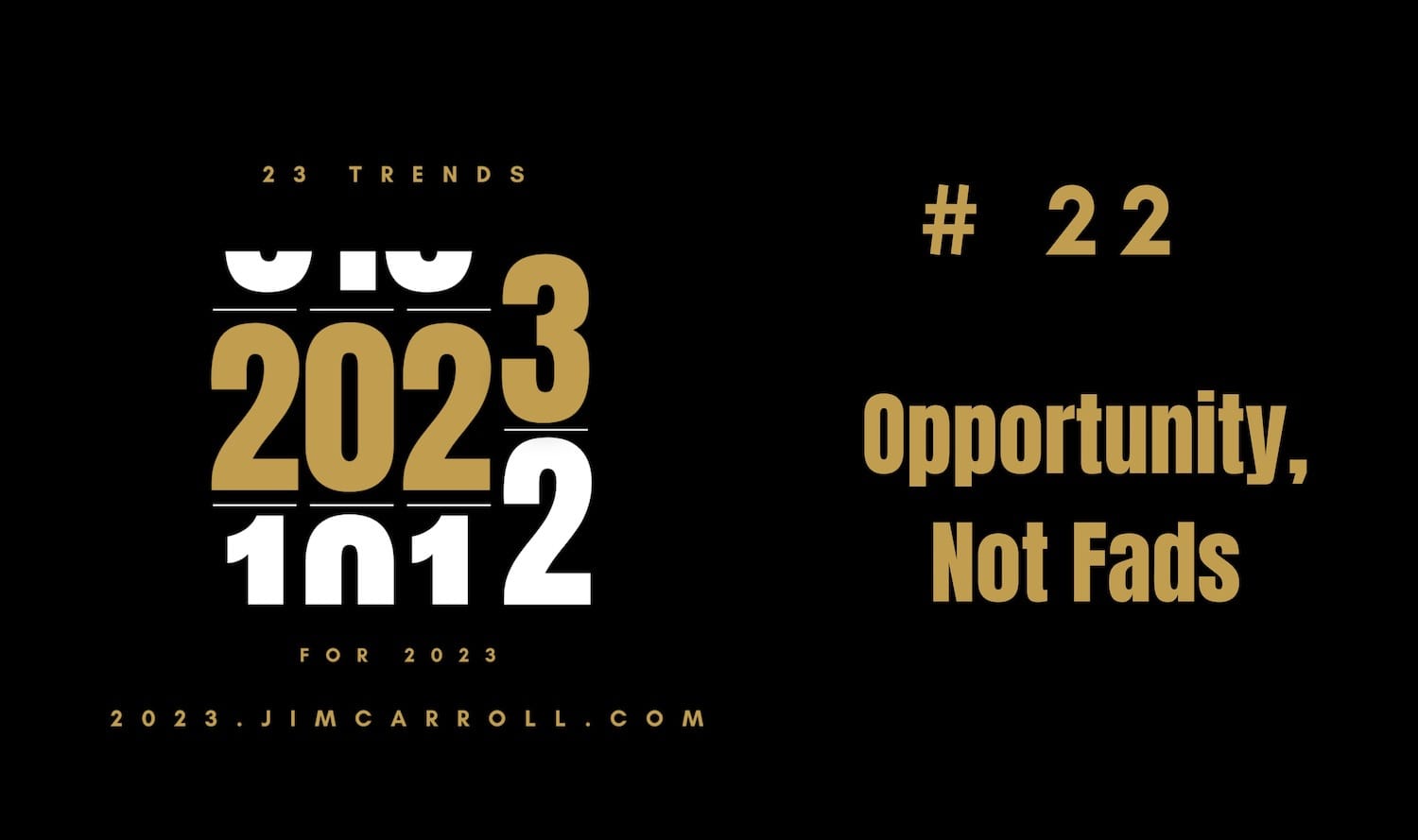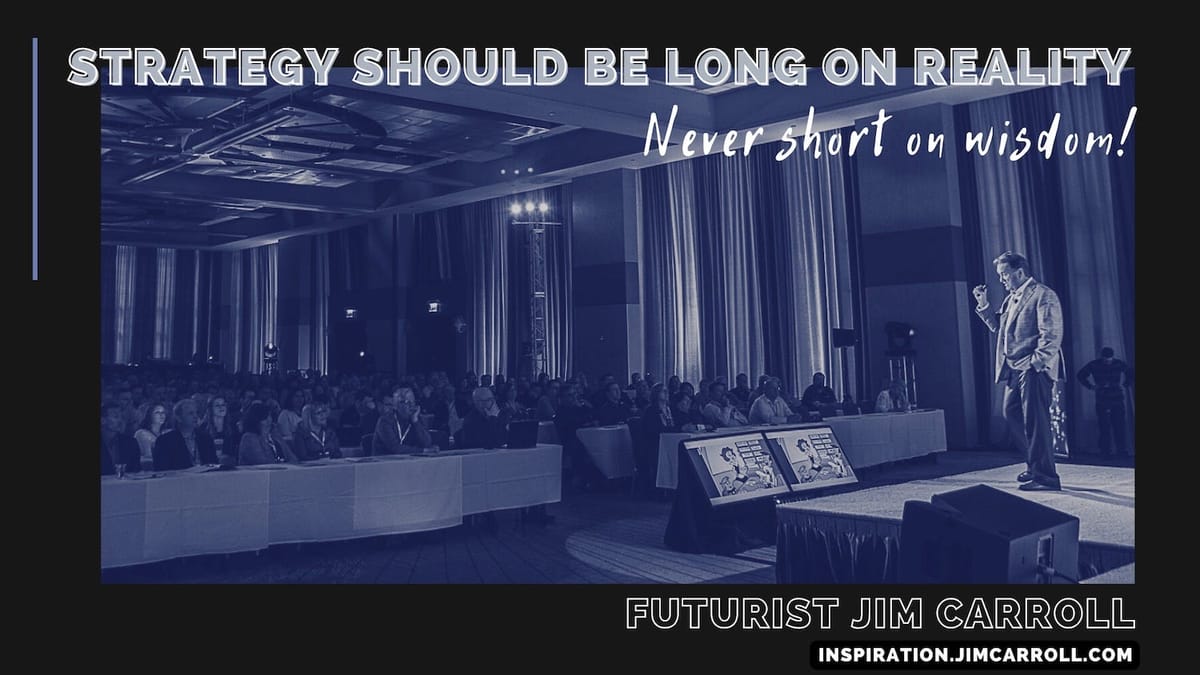Looking back, one of my proudest moments from 2022 has to be when I lost out on a speaking gig because I advised the client - a major global Swiss firm - that I couldn't quite tell the storyline they wanted to hear. They were looking for a keynote that outlined the huge, future opportunities in the world of cryptocurrencies - but I demurred because I didn't think their expectations were realistic. The lead organizer of the event seemed to be caught up in the crazy world of the hype of crypto; I wasn't and told him so. I suggested I could give a realistic overview of what was really going on, including the possibility of a crash and collapse.
I didn't get the gig and lost out on a substantial fee, but in retrospect, managed to keep my integrity and dignity intact!
Going into 2023, we've managed to turn off the engine of technology overhype for a time, and that is a good thing! The result is that I believe many organizations will be focusing much more of their strategic thinking time on the real trends that matter, and not chasing the 'shiny objects' of unrealistic trends that might never have an impact. That's why trend #22 of my "23 Trends for 2023" series is Opportunity, Not Fads. It comes in the wake of trend #1, Techno-skepticism.

With the ongoing implosion of the world of crypto and other trends during the last year, I can look back and point to the stories I told on stage where skeptical caution was well-warranted. And often, I had a lot of fun while doing so.! Consider this clip from 2018 where I'm talking about BitCoin.
I've been in this weird space before - of being the contrarian in the face of relentless hype. Back in 1999, I spent a fair bit of tie in the media speaking about the ridiculous levels of hype around dot.com companies. I took a fair bit of abuse at the time for doing so but was proven right. After all, the dot.com world imploded in a cascade of failed companies with busted strategies.
The words of Warren Buffett nail the issue of hype, trends, and FOMO (fear of missing out) with his observation that the five most dangerous words in business are "everybody else is doing it". He's also made this brilliant observation: "Be fearful when others are greedy, and greedy when others are fearful." No wonder he is the most impressive investment guru of all time - because he has quite successfully avoided fads and hype.
Contrast him with Kevin O'Leary, who ended up with a $15 million payday for hawking the now-failed crypto exchange FTX and his praise for the new icon of overhype, Sam Bankman-Fried,
“It was a new gold rush,” Mr. O’Leary recalled, in an interview. “Everyone wanted in.”
Everyone wanted in. No truer words were ever said by the idiots who rush in with the other idiots who are rushing in. My idea has always been that as soon as people start talking about a gold rush, you should run away - very quickly!
And so the predictable things happened. In a recent podcast with psychologist Steven Pinker, respected 98-year-old investor Charlie Munger says the biggest mistakes he has made in his long career were born out of wishful thinking.
Wishful thinking is the bias we succumb to when we are unable to separate what we want to be true from what actually is true and what is rational according to the evidence we have in front of us. At its core, wishful thinking is an inability to deal with reality as it is and an unwillingness to update our beliefs when new evidence emerges.
From crypto to renewables, don’t buy into the hype
4 November 2022, The Australian
Crowd psychology is a dangerous thing. Wishful thinking is not a strategy.
Back to my potential Swiss client. At the time of our conversation last spring, it became evident that the lead organizer was looking for something that tied into all the crazy hype of the time In essence, a keynote that would validate his idea that crypto, Web 3.0, NFTs, the metaverse, and other overhyped concepts were the next big thing - and that this glorious world of huge opportunity was emerging. In our exploratory conference call, I gave my balanced overview, based on my keynote topic outline that I had put together quite some time before. My key point? I could help them understand this complex new world - but with a talk that outlined the good, the bad, and the ugly rolled together Realism, not hype. Here's my keynote topic outline, which can still be found on my site:
Deciphering The Disruption: Deconstructing the Metaverse, Blockchain & Crypto, NFT’s, Web 3 and More – A Reality Check for Humans!”
In as little as ten years, the very concept of money might have been forever changed by crypto-currency and blockchain technology – and then again, it might not. And the fact is, the same might be true of all the trends that now dominate our new vocabulary – from the metaverse to NFT’s, Web3 to Bitcoin. What’s real, and what’s not? Are we about to unleash a wave of innovation that parallels and exceeds the impact of the arrival of the Internet economy? Or are we simply being held hostage to the accelerated hype machine of Silicon Valley and venture capitalists, eager to cash in on an accelerated world of faster FOMO – “fear of missing out?”
He didn't want the ugly. He wanted the glory! I was advised a few days later that 'they decided to go in a different direction.' And so my keynote that promised a balanced view of the future was, let's say, rejected.
Fast forward to today, as we go through the cold winter of another tech-overhype collapse. No one is talking much more about the metaverse, blockchain, crypto, NFTs, and Web3 .... the hype machine has collapsed as the cold harsh reality of reality settles in. Hype is not a trend. It's a fad. Trend #1 of this series has been the emerging world of 'Technosketpcism' - and it is well warranted.
I've long said that we should excel at seizing opportunities, not fads!

That's why I've been emphasizing that organizations that are focused on real strategy, not fads, are working hard at a strategic level to deal with what they really need to concentrate on, and that will be the big trend for 2023. Things like managing economic volatility, supply chain issues, staffing challenges, and other issues. They've got bigger concerns to worry about than the price of Bitcoin, virtual avatars, or weird monkey art.
In other words, tapping into future opportunities while managing the challenges that surround them!
And that's why this is trend #22 of my 2023 trends series!
Futurist Jim Carroll remembers turning down a significant opportunity with a dot.com company in 1999 because he believed the hype was getting out of hand, and he wanted to spend more time with his 4 and 6-year-old sons. The company imploded soon after - but Jim has a wonderful relationship with his sons to this day. He chose wisely, and to him, that defines success.

